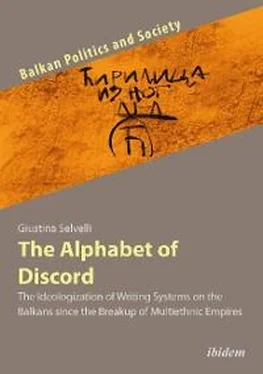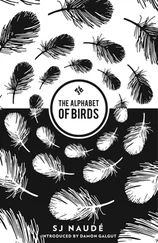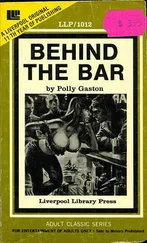We pray that our Government will transmit to the League of Nations our and our children’s strong protest against the grave insult to our national pride and consciousness.
We confirm our decision to support until death our fathers’ institutions and the pure Greek tradition of Alexander the Great.
We declare a bloody war against any violent and illiberal plot against our Greek mother tongue.
We reject the instruction of the Macedono-Slavic dialect in schools, reviving memories of violence, fear, terror, gallows—i.e., the traditional means of Bulgarian practice. […] (in: Michailidis, ibid.)
Undoubtedly, such externalization of Greek identity and rejection of the Bulgarian—or “Slavic”—one can be comprehended on the basis of at least two considerations. Firstly, and rather predictably, by the fact that a population generally prefers to learn and use a writing system that is as close as possible to the prestige language that surrounds it, in order to better integrate into the social context of reference (Berry 1977: 5). Secondly, it should not be forgotten that illiteracy rates were very high at the time, a context that favored the control and manipulation of literacy practices for assimilationist purposes by Greek institutions in various ways.
To conclude, it is clear that the Greek government decided to use Latin characters expecting that the Abecedar would be rejected by all actors for this very reason. After various protests from the addressees, almost all copies of this primer were destroyed, and those that remained were withdrawn from circulation. There was no more discussion of education in the mother tongue and in 1927 the Greek government issued a directive aimed at removing all Cyrillic inscriptions from churches, tombstones, icons, and all other monuments in the area: a veritable campaign against this alphabet, revealing an assimilationist and mono-ethnic policy (Rossos 2008: 147). Such destruction of the cultural heritage of minority writing would be repeated on many occasions in the following history of the Balkan region, and not only in Greece. 10In addition to this, in August 1926, the Greek government and the Kingdom of Serbs, Croats and Slovenes signed a protocol recognizing the Serbian nationality of the Slavic-speaking minority in Greece (Tramontano 1999: 328), a move clearly aimed at keeping Bulgaria out of the matter in every respect.
We can observe two other a posteriori elements in relation to the Abecedar, which, in a sense, seem to contradict each other. The first is that, at the time of its publication, this primer, which “teemed with errors” (Kočev 1996: 54), certainly did not help create a writing tradition or keep an existing one alive. In fact, as a result of this affair, and especially after a new law passed in 1936 (cf. Tramontano 1999: 328), the local Slavic language spoken by the population in Aegean Macedonia was also banned in its oral form in public places, surviving only in the domestic environment (Kočev, 1996: 54). In light of this, we can see a further reinforcement of the Greek campaigns of cultural assimilation, confirming that, in the process of creating an independent state after a previous imperial condition, nationalism inevitably coincides with the emergence of forms of “cultural centralism” (Zakhos-Papazahariou 1972: 150).
The second consideration to be made is that, although in practice the primer never reached the school desks of the children of the Slavic-speaking community, it is still considered by Macedonians today 11as one of the most significant testimonies to the existence of a significant national Macedonian community in Greece, and to its language and thus identity (Andonovski 1985: 8). 12
1See on this topic the works Orientalism , by Edward Said (1978) and Imagining the Balkans , by Maria Todorova (1997).
2The term “Significant Others” is used in social psychology to refer to those persons who are of sufficient importance in an individual‘s life to influence his or her emotions, behavior, and sense of self. The first definition of Significant Others dates back to the American psychiatrist Harry Sullivan in 1940. This term can be used at the “macro level” in the study of ethnopsychology or “national psychology”.
3Other publications of the period dealing with these issues are La protection des droits des minorités dans les traités internationaux de 1919-1920 by M. V. Vishniak (1920), Le problème des minorités devant le droit international , by Jean Lucien-Brun (1923), Les minorités, l‘État et la communauté internationale by Dragolioub Krstitch (1924).
4See Roudometof: “the Bulgarian crusade for a national church entailed a direct challenge to the whole Ottoman concept of administration, which identified nationality with religious confession. This was because the Bulgarians did not possess a state of their own (at least until 1878), and therefore there was no territorial political unit that could be directly linked to a Bulgarian church” (2002: 85).
5I employ this term in a neutral way to identify the Slavic-speaking communities present in Greek territories in that period.
6Cit. in Kuševski 1983: 187.
7Cited in the preface to the third edition of the Abecedar in 2006.
8Cited document: United Nations Library and Archive Geneva, R. 1975, Doc. No. 41/47674/39349
9Guentcheva notes: “Though the commission of linguists and writers recommended simplification of the graphic system, the majority of the intelligentsia in Bulgaria insisted on retaining the visual distance between Bulgarian and Serbian through orthography” (ibid.).
10Examples of this are the destruction of the written heritage in Arabic characters in Bulgaria, both in the first years of independence and during the assimilationist campaigns in the last years of communism (consisting of gravestones in Arabic or Turkish characters, school registers, documents in Turkish), the destruction of the written heritage in arebica in Bosnia during the war by the Bosnian Serbs and the campaigns against the Cyrillic script in Vukovar, as we will see in chapter 8.
11Those in Greece, in the Republic of North Macedonia and in the world diaspora.
12The Abecedar has been reissued two times since 1925, first in 1993 by the Macedonian Information Center in Australia and then in 2006, in Thessaloniki, at the initiative of the Macedonian ethnic (Slavic) political party, Rainbow. In line with the principles of its political platform, the Rainbow Party states that the Abecedar constitutes one of a series of official Greek documents that distinguished Macedonian identity from Greek identity well before 1945.
Конец ознакомительного фрагмента.
Текст предоставлен ООО «ЛитРес».
Прочитайте эту книгу целиком, купив полную легальную версию на ЛитРес.
Безопасно оплатить книгу можно банковской картой Visa, MasterCard, Maestro, со счета мобильного телефона, с платежного терминала, в салоне МТС или Связной, через PayPal, WebMoney, Яндекс.Деньги, QIWI Кошелек, бонусными картами или другим удобным Вам способом.












